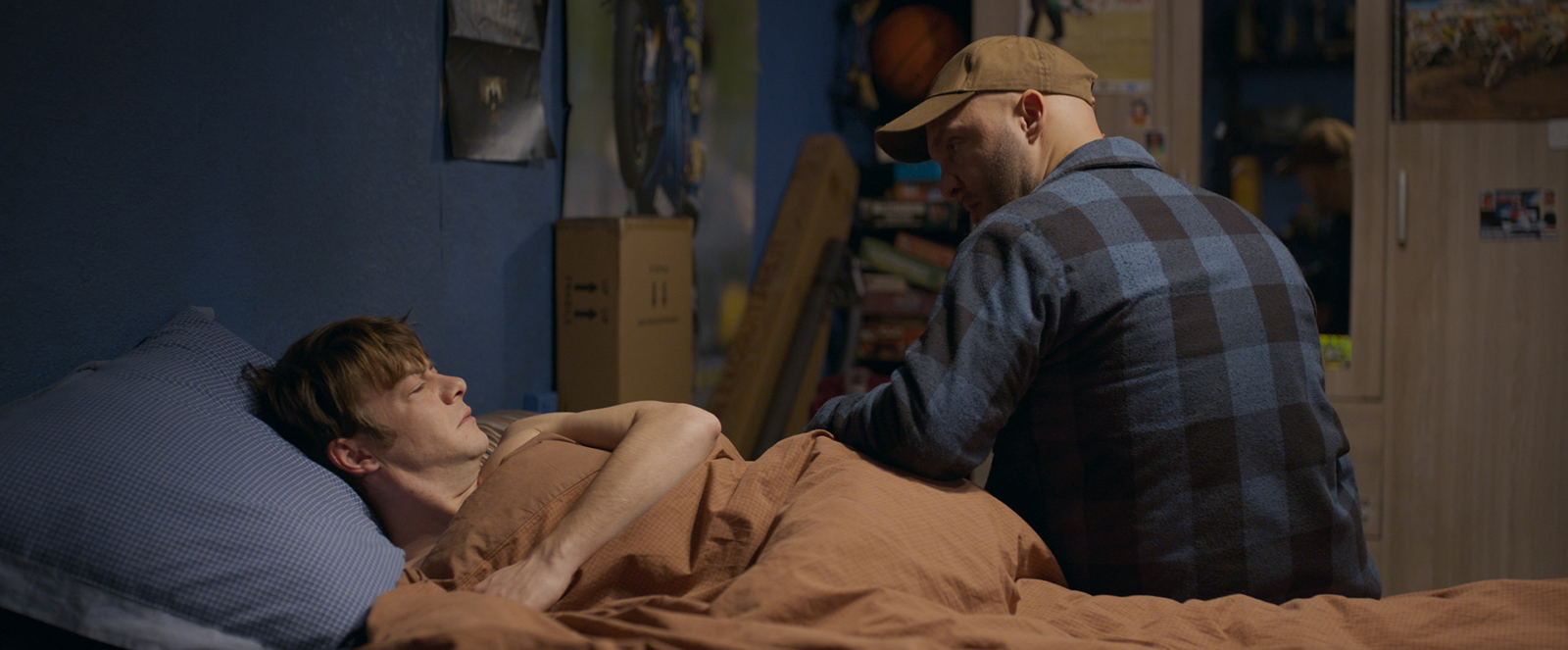
In “Misericordia,” a rakish youngish guy named Jérémie drives back to a French village for the funeral of his old boss, a baker, who has kicked the bucket at 62. And the instant the widow lets Jérémie (Félix Kysyl) into the living room, he and the baker’s adult son, Vincent (Jean-Baptiste Durand), a mushroom forager, share the sort of charged eye contact that tells you “Yup, these two definitely did it.” We don’t know when or how far things went. Something happened, though. But because “Misericordia” (Latin for “mercy”) has wafted from the cauldron of writer and director Alain Guiraudie, it’s possible I’m wrong.
Ambiguity? Mixed motives? Casual lawlessness? These are his considerable strengths. “Misericordia” culminates in kink, killing and some gloriously literal deus ex machina. So maybe what I’m experiencing as an erotic charge is caution. But again, it’s Guiraudie, the man who brought us the 2014 murder-at-the-gay-nude-beach sensation “Stranger by the Lake” and a bedroom farce (“Nobody’s Hero,” 2023) whose component parts included racism, terrorism, sex work, domestic violence, paranoia, jogging and vaping. The caution is erotic.
His movies, meanwhile, prove absorbingly absurdist, this new one especially. It’s got its own rhythm. If Guiraudie isn’t mocking the way we’ve been trained to receive stories, films, people, then he’s at least disrupting the usual patterns — retraining us to see anew, to suspend expectation and abandon comfort the way that John Waters and Mike Leigh, Aki Kaurismaki, Hal Hartley and the other oddball live-action cartoonists have. It’s risky, but something thrilling and often true usually comes of it.
Guiraudie presents life at its basest and gamiest. So I trust my instincts about Jérémie and Vincent. I know hunger when I see it. And “Misericordia” is dotted with hungry eyes. Jérémie stays the night at the widow’s. The room she offers is the one Vincent grew up in, maybe the room where It Happened. Jérémie and Vincent even make the bed together. But rekindling’s not on the program. Regression, maybe. The bed all made, Vincent — who’s pushing 40, is bald and has a lisp and a cleft lip — suggests playing some Yahtzee like they used to. Jérémie declines.
From there, reunion curdles into disunion. And the homecoming movie you might have been wanting becomes the funkier tale of a sociopath who opts to overstay his welcome. Jérémie doesn’t get up to much: the occasional drive around town, a walk in the forest, some horseplay with Vincent on the forest floor where he should be foraging for mushrooms. What does he want? The late baker’s clothes, for one thing; his shoes, too. The widow, Martine (Catherine Frot), seems super OK with that. She doesn’t even appear to mind the probability that Jérémie’s list of infatuations likely included her husband. They flip through a photo album together and admire how good the dead man looked in a Speedo. (They’re not wrong.)
It’s rare for a fawn like Jérémie to evolve into a real piece of work, the rakish rake, arousing suspicion and lust and confusion in just about everybody, except for Martine, who poor, increasingly indignant Vincent swears Jérémie wants to sleep with. (“Oh, buddy, stick to mushrooms,” I thought; but in a movie like this, a son knows.) Kysyl isn’t asked to express much. That isn’t Guiraudie’s approach to performers. His characters may not behave like anybody you know. But they also don’t act like they’re in a movie, either. He likes his casts just north of blank, registering reactions, managing stress, symbolizing, thrusting. Kysyl is filmed from low angles that keep looking gnomish and witchy. Nonetheless, his job is to remain vexing with his innocent air and apparent lack of premeditation.
After about an hour, “Misericordia” becomes an increasingly bent kind of murder mystery in which the weapon comprises sticks and stones; in which we can tell who’s lying better than the two cops on the case; in which the village abbot (Jacques Develay) proves suspiciously omnipresent, omnipresently suspicious and a touch covetous himself. The mystery is not who’s done it or even why (although, as movie murders go, this one feels needless), but how this person will get away with it and who bestows the misericordia.
In about a quarter-century of filmmaking, Guiraudie’s become a maestro of indirection. His films proceed according to their own logic. The movies make no psychological sense. Or maybe it’s more accurate to say that they’re completely psychological and therefore about human behavior — impulses, urges, drives, reactions — and less about people having the sex and doing the killing. So much of the action takes place outside — in the woods, even the sex — because, in Guiraudie, we’re all naked somehow, a bunch of chipmunks, weasels and owls. Spies, liars, losers, cretins and creeps: These are people who don’t know they’ve lost the plot, that they’re out of control. Would a squirrel know? The dangers in his movies differ, but intruders are everywhere. And they’re always — and I mean always — hiding in the bushes.
Guiraudie knows that a lot of us have seen “Stranger by the Lake” and probably want more of that — heads bobbing over torsos and sunbathers’ uncut gems, sure, but also tight, clean narrative lines; clever structure and pacing; traditional suspense; a death that breaks your heart; cogent gay politics. Maybe there’s another one of those in him, an ultimately moral oblong masterpiece. But it’s not as if he’s lost the plot. I’d say he’s interested in threatening genres and curious about how much murder he can get away with. “Misericordia” is film noir with the lights turned on. Even when its characters are working your nerves, it tickles. Guiraudie is playing those nerves like a harp.


 PREVIOUS ARTICLE
PREVIOUS ARTICLE
